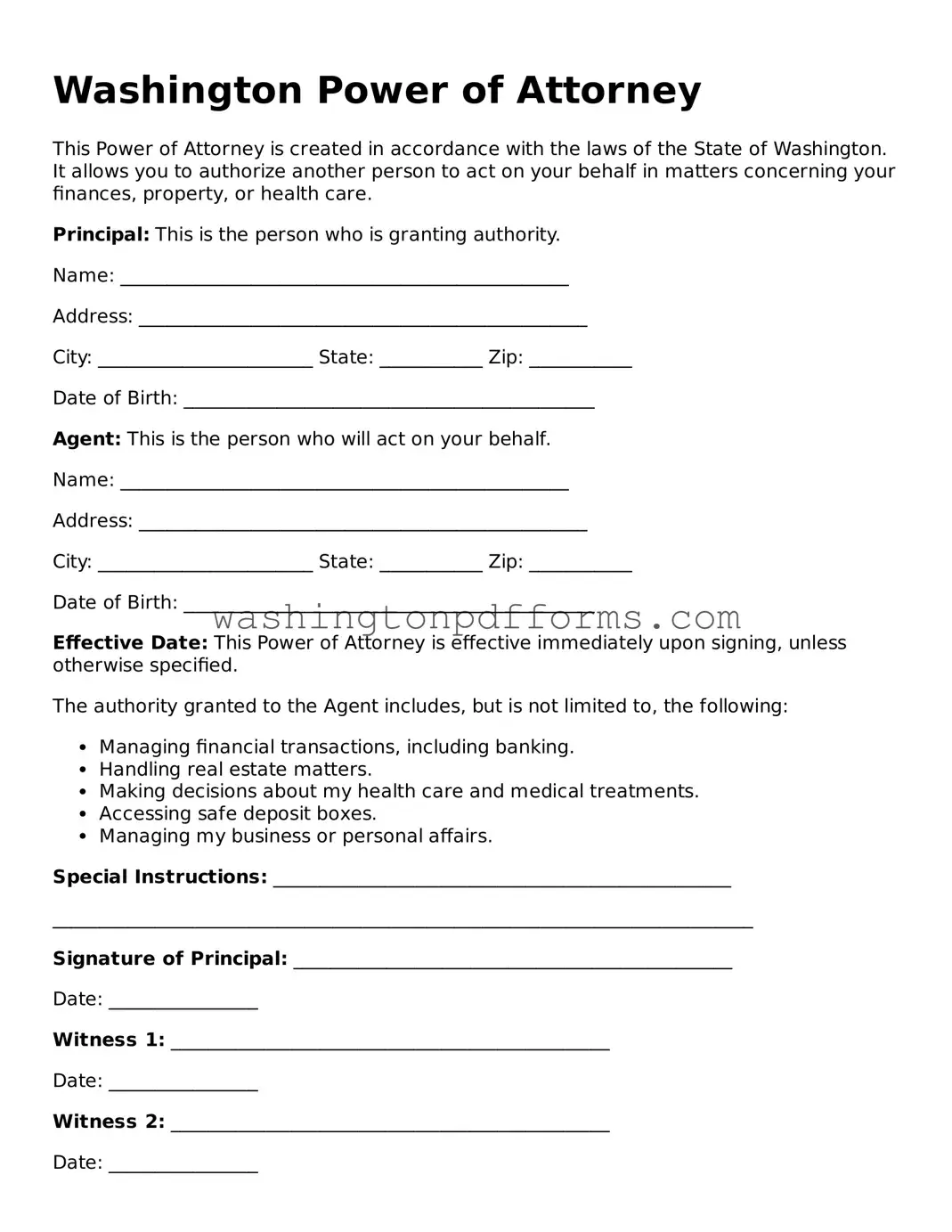Attorney-Approved Washington Power of Attorney Template
In Washington State, the Power of Attorney (POA) form serves as a vital legal tool, empowering individuals to designate someone they trust to make decisions on their behalf. This form can cover a wide range of responsibilities, from managing financial matters to making healthcare decisions, depending on the type of POA established. There are several variations, including general, limited, and durable powers of attorney, each tailored to specific needs and circumstances. It's essential to understand that a properly executed POA can help ensure that your wishes are honored, especially in situations where you may be unable to communicate or manage your affairs. Additionally, the form must adhere to specific requirements set forth by Washington law to be valid, including signatures and notarization. Given the potential implications of this document, it is crucial to consider your options carefully and select a trusted agent who will act in your best interest. The urgency of addressing these matters cannot be overstated, as having a Power of Attorney in place can provide peace of mind and clarity during challenging times.
Common mistakes
Filling out a Power of Attorney form in Washington can seem straightforward, but many people make common mistakes that can lead to complications later. One frequent error is not specifying the powers granted. It's crucial to clearly outline what authority you are giving to your agent. Without this clarity, your agent may not be able to act on your behalf when needed.
Another mistake is failing to date the document properly. A Power of Attorney must be dated to be valid. If you forget to include the date, it may raise questions about when the authority actually begins. This can create confusion and could potentially invalidate the document.
People often overlook the need for witnesses or notarization. In Washington, certain types of Powers of Attorney require either a witness or notarization to be legally binding. Neglecting this step can render the document ineffective, leaving your wishes unfulfilled when it matters most.
Additionally, individuals sometimes forget to inform their chosen agent about their role. It's important that the agent understands their responsibilities and is willing to accept them. If the agent is unaware or unprepared, they may not be able to act effectively on your behalf.
Lastly, failing to review and update the Power of Attorney can lead to problems. Life changes such as divorce, relocation, or changes in health can affect your choices. Regularly reviewing the document ensures that it reflects your current wishes and circumstances.
Similar forms
- Living Will: This document outlines your wishes regarding medical treatment in case you become unable to communicate. Like a Power of Attorney, it grants authority to make decisions on your behalf, but it focuses specifically on healthcare choices.
- Healthcare Proxy: Similar to a Power of Attorney, a healthcare proxy allows you to appoint someone to make medical decisions for you. The key difference lies in its exclusive focus on health-related matters.
- Durable Power of Attorney: This is a specific type of Power of Attorney that remains effective even if you become incapacitated. It ensures that your chosen agent can continue making decisions for you when you cannot.
- Financial Power of Attorney: This document specifically authorizes someone to manage your financial affairs. It shares similarities with a general Power of Attorney but focuses on financial decisions only.
- Trust Agreement: A trust allows you to transfer assets to a trustee who manages them on behalf of beneficiaries. While a Power of Attorney grants decision-making authority, a trust involves asset management and distribution.
- Will: A will outlines how your assets will be distributed after your death. While it does not grant authority during your lifetime, both documents deal with your wishes regarding your estate and can complement each other.
- Advance Directive: This document combines elements of a living will and a healthcare proxy. It provides instructions for medical care and designates someone to make decisions, similar to a Power of Attorney focused on health issues.
Some Other Washington Templates
Washington State Articles of Incorporation - Properly filed Articles can facilitate various banking and legal processes.
Separation Agreement Washington State - This agreement can help both parties feel heard and considered.
Quit Claim Deed Washington State - By using a Quitclaim Deed, parties promote ease of access in property rights transfer without extensive legal procedures.
